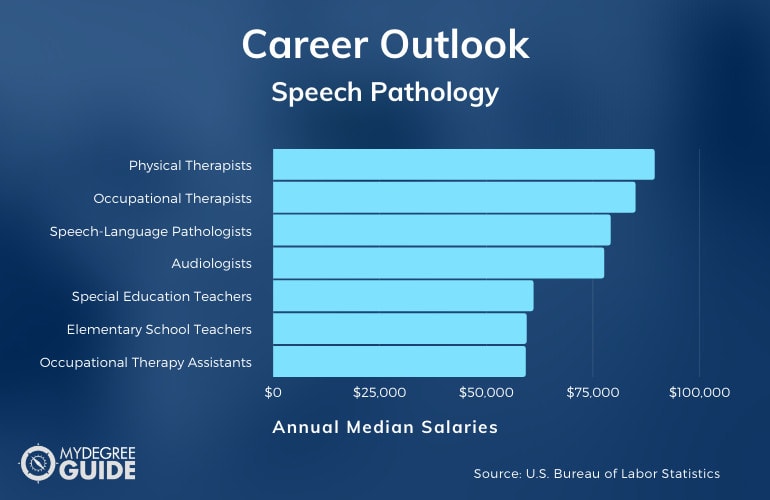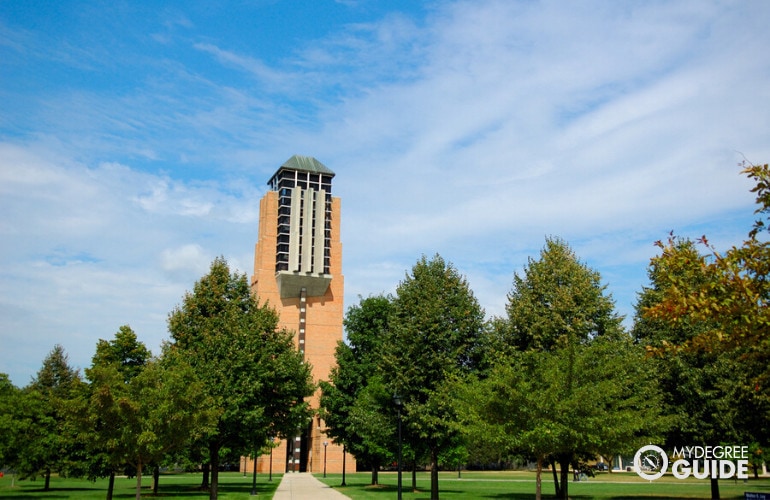Wondering how to become a speech pathologist?

As you fulfill the educational and licensing requirements for this career path, you may develop many needed skills in this field that can equip you to help others. The Bureau of Labor Statistics forecasts significant job growth for this field.
Editorial Listing ShortCode:
With the right degree and certification, you can pursue well-paid jobs in diverse settings, such as schools, hospitals, rehabilitation clinics, and even research institutes.
How to Become a Speech Pathologist
The first step in becoming a speech language pathologist entails earning an accredited masters in speech pathology after completing your bachelors. You might find that an online masters degree program offers the most convenient learning options. A growing number of universities even offer online speech pathology masters programs with no GRE requirement.
If you’re still on your way to getting a bachelor’s degree, you may want to consider choosing a related major, such as communication sciences or physiology. Once you’ve completed your bachelor’s degree, here are the key steps you’re likely to follow if you want to become a certified speech-language pathologist:
- Master’s degree. Obtain a master’s degree in speech language pathology from an accredited program.
- Clinical internship. Complete a clinical internship or practicum, usually related to your master’s program.
- State board requirements. Complete any state board or other professional licensing examinations and requirements.
- Supervised internship or fellowship. Complete any supervised clinical internships and postgraduate fellowship programs required for obtaining professional licensure or certification.
Licensing requirements can vary from state to state, so it can be beneficial to familiarize yourself with the requirements of the state licensing board in the state where you plan to work.
Top 3 Things You Can Do as a Speech Language Pathologist (SLP)

Speech language pathology is a specialized occupation, but certified speech-language pathologists can serve different kinds of clients in a range of settings.
Speech language pathologists are often needed in schools, hospitals, research centers, and rehabilitation facilities. They may be employed by community mental health agencies as well.
1. School Speech Therapist

Most school districts employ full-time speech therapists to help identified students with special needs improve vocalization and expressive speech or overcome impediments, such as stuttering.
Educational speech therapists’ responsibilities can include evaluating students, developing treatment or intervention plans, and providing one-on-one speech language therapy. They may also collaborate regularly with teachers, school psychologists, and school nurses, assisting in evaluating student progress and recommending helpful interventions.
2. Occupational Therapist

Some speech language pathologists work in a medical setting, such as a hospital or rehabilitation center, providing therapy and other rehabilitation services.
They can work alongside doctors, physical therapists, and occupational therapists, assessing patient needs and helping patients manage a speech disorder resulting from an illness or injury.
3. Audiologist
Audiologists work in a specialized branch of speech language pathology. Audiologists study the impact of hearing deficits on speech and use their specialized training to work with patients who are deaf or hearing impaired.
They can work alongside special education staff in a school setting, work in a school for the deaf and blind, or work in any number of community health agencies or medical settings.
Speech Pathology Specialty Areas

Speech disorders can impact speech acquisition and can stem from hearing impediments or from medical conditions and aging. So, there are many areas of specialized learning and practice within the field of speech language pathology.
- Speech Fluency and Fluency Disorders. This branch of speech language pathology is focused on helping patients communicate more confidently and overcome vocalization deficits or fluency disorders, such as stammering or stuttering.
- Audiology. Since hearing and discerning vocal sounds is directly related to speech function, some speech pathologists specialize in the study of audiology and commonly help prescribe hearing devices or provide speech therapy for deaf or hard-of-hearing patients.
- Educational Speech Therapist. An educational speech therapist specializes in childhood speech development, language acquisition, speech enunciation and vocalization, and emotional, physiological, and neurological factors impacting speech and language development.
- Medical Speech Pathology. This branch of speech language pathology focuses on medical and neurological conditions related to illness, aging, and injuries, and the practitioner’s role may include evaluating, diagnosing, and treating communication disorders in medical settings.
In your speech language pathology coursework, you’ll likely be introduced to all of these areas of practice, but you can choose to obtain specialized certification and training as well.
Speech Pathology Careers & Salaries

According to the Bureau of Labor Statistics, someone interested in speech language pathology careers can pursue many job opportunities by specializing in SLP. Graduates may also prepare for similar jobs in related fields, such as physical therapist, health educator, or special education teacher.
| Careers | Annual Median Salaries |
| Physical Therapists | $89,440 |
| Occupational Therapists | $84,950 |
| Speech-Language Pathologists | $79,120 |
| Audiologists | $77,600 |
| Special Education Teachers | $61,030 |
| Kindergarten and Elementary School Teachers | $59,420 |
| Occupational Therapy Assistants and Aides | $59,200 |
| Social Workers | $50,470 |
| Recreational Therapists | $48,220 |
| Health Educators and Community Health Workers | $46,910 |
Certified speech-language pathologists can pursue many well-paid jobs in diverse settings, so it’s possible that you may find the right role for your professional interests and goals.
Speech Pathology Internship Opportunities

Graduate programs in speech language pathology typically require a supervised clinical experience, a component of your training that can pose some challenges while offering you many unique benefits.
- Finding an internship. Some graduate programs have a network of internship providers that makes it easy to find an internship. Otherwise, you can try connecting with a professional SLP association, such as ASHA, for help finding internship opportunities.
- Career exploration. If you’re able to find an internship in a setting you want to explore, your internship can be an opportunity to experience life on the job in a setting that interests you, such as a hospital, social service agency, or school.
- Work experience. A unique benefit of an internship can be the chance to supplement your academic study with hands-on supervised clinical experience and training opportunities you can’t replicate in the classroom.
- Making the most of your internship opportunity. Once you land an internship, it’s helpful to listen carefully to what your supervisors expect from you. You can also respectfully communicate your own internship goals in order to help get the best outcome possible.
Internships may pose some challenges, but they’re also a great way to get valuable training and start building your professional network and professional resume!
Accreditation

When choosing an on-campus or online graduate speech-language pathology program, our recommendation is to choose a regionally accredited university.
Since schools have to earn accreditation from an independent, third-party entity, choosing an accredited school can help ensure the high quality of the educational content and services you’ll receive for your tuition dollars.
Regional accreditation also helps ensure that your graduate degree, course credits, and learning experiences will be honored by prospective employers, state licensing boards, and other universities.
An accreditation organization such as the Council for Higher Education Accreditation (CHEA) can provide you with more information on finding accredited schools.
CAA Accreditation for SLP Programs

Specialized and curriculum-specific accreditation, called programmatic accreditation, exists for educational programs that prepare professionals in any number of fields.
Programmatic accreditation can be important when you’re planning to work in a highly regulated profession, where up-to-date professional knowledge and ethical standards are of paramount concern to employers.
For speech language pathology programs, programmatic accreditation is offered by The Council on Academic Accreditation in Audiology and Speech-Language Pathology (CAA) of the American Speech Language Hearing Association (ASHA).
Looking for CAA-ASHA accreditation is one strategy for finding top-tier SLP graduate education and training programs. Enrolling in an CAA-ASHA accredited program may prove beneficial when you’re trying to qualify for your professional licensure or certification.
What Is a Speech Language Pathologist (SLP)?

A speech language pathologist is a trained medical practitioner who helps diagnose, assess, and treat various speech challenges.
Speech challenges can include communication and swallowing disorders, speech fluency or vocalization impediments, and specific speech impediments like stammering or stuttering. Speech language pathologists specializing in audiology often work with the deaf and hard of hearing.
SLP practitioners who work primarily to support patients with treatment or rehabilitation may be referred to as speech therapists. Speech therapists can work with elderly patients whose speech function is affected by illness or aging, or they may work in a medical setting or rehabilitation facility.
They often find work in schools as well, helping students with fluency, vocalization, or other specific speech impediments.
Is It Hard to Become a Speech Pathologist?

Becoming a speech pathologist means getting a master’s degree in an accredited speech language pathology program. Sometimes an SLP will also pursue a PhD for additional specialization or to engage in more advanced research.
To graduate from your master’s program, you’ll usually take foundational courses in speech language pathology to learn about common communication disorders and their diagnosis and treatments. You may also study audiology and the science of hearing and speech, including pediatric audiology, rehabilitation audiology, and communication science.
Some courses are likely to include the study of neurology as it relates to speech while other courses may cover aphasia and voice disorders. Becoming a certified SLP also involves supervised internships, licensing examinations, and other licensing board requirements that can vary from state to state.
What Does a Speech Pathologist Do?

Speech pathologists help people of all ages with communication disorders. Common roles of an SLP include helping patients with rehabilitation needs due to conditions impacting speech, hearing, or communication and swallowing disorders. Speech pathologists also help children or adults with speech fluency and vocalization challenges.
Some speech pathologists specialize in audiology and work with the hard of hearing, assisting them with hearing rehabilitation or speech challenges that resulted from hearing loss or deafness.
Specific roles include working in SLP research and science, diagnosing and assessing speech conditions and disorders, and providing speech therapy directly to patients.
Is a Speech Pathologist a Doctor?

Speech language pathologists are licensed medical professionals. So, in some settings patients or colleagues might refer to them with the title “doctor,” but they’re not actually medical doctors (MDs).
That said, if SLPs decide to earn a PhD in Speech Pathology, they have earned the right to be called “doctor” as an expert in their field. They are still not an MD, though.
In the case of an SLP practitioner, getting a PhD does not denote the kind of intensive medical training and preparation that a medical doctor undergoes. Instead, a PhD degree usually means the SLP has chosen to engage in advanced academic study and research.
Where Do Speech Pathologists Work?

If you become a licensed practitioner, you can elect to pursue jobs in any number of work settings.
Many speech pathologists work in hospitals or clinics or work for community health agencies that partner with healthcare facilities. Others provide services to patients in elder care settings or in rehabilitation facilities, where patients of all ages may need speech therapy or related treatments due to illness or injury.
Some SLP practitioners work in school settings, supporting teachers and school psychologists or helping designated students with speech and language development, speech acquisition, or speech impediments. A medical speech pathology specialist in a school setting can also help schools identify communication disorders and develop treatment plans.
How Much Does a Speech Pathologist Make?

How much you make as a professional in this field will likely depend on your level of training and education, your work history, and your areas of specialization.
If you provide routine speech and language therapy services in a school setting you might earn what other special education teachers earn, which is an average salary of$61,030 (Bureau of Labor Statistics).
According to the Bureau of Labor Statistics, the average annual salary for audiologists is $77,600, and the average salary for speech-language pathologists is $79,120. If you go on to earn a doctoral degree and are engaged in specialized research or advanced medical practice or consulting, you might have an even higher earning potential.
How Long Does It Take to Become a Speech Pathologist?

The road to becoming a practicing professional typically involves graduating from an accredited master’s degree program in speech language pathology. So, you’d first have to earn your bachelors degree, which takes an average of 4 years to complete.
A master’s program in speech language pathology may take another 1 to 2 years for most people. How long you’ll need to become an SLP can depend on your specific college programs and how long it takes you to obtain the required degrees.
Another consideration is the time it will take to complete internships, other licensing requirements, and any additional fellowships in order to obtain licensure and any certifications from your state board.
What Is the Difference Between a Speech Therapist vs. Speech Pathologist?

Speech therapists are trained speech pathologists. Sometimes the titles may be used interchangeably.
In many settings, such as schools and rehabilitation centers, an SLP will often be referred to as a speech therapist if their main responsibility is to provide direct support services and interventions to students or patients.
Some SLPs may have the skills needed to provide direct therapy to patients. Speech pathologists can also serve in other roles, such as doing research in their field or focusing on diagnosing and assessing speech disorders.
What Is the Difference Between Audiology vs. Speech Pathology?

Audiology is often designated as a specialization within the study of speech-language pathology. If you elect to specialize in audiology, you can learn about hearing disorders and related speech disorders and therapies.
You can also learn about working with people who are deaf or have suffered from hearing loss. Some roles of an audiologist include helping patients with hearing devices and helping patients overcome speech challenges related to a hearing deficit.
Is Becoming a Speech Pathologist Worth It?

Yes, getting a graduate degree in speech-language pathology is worth it for many students. The Bureau of Labor Statistics is projecting 25% job growth for speech-language pathologists through the next ten years, much faster than the average for all occupations.
Common careers in this field include speech language pathologist and speech therapist, audiologist, occupational therapist, and occupational therapy assistant. Becoming a certified speech-language pathologist can open doors to well-paying job opportunities in a rapidly growing, in-demand field.
As a qualified speech language pathologist or speech therapist, you may pursue job opportunities in schools, hospitals, clinics, rehabilitation centers, research institutes, and community health organizations. So, a number of professionals find that speech pathology is worth it as a career.
Getting Your Speech Pathology Degree Online

With an astounding 15% job growth forecast for the healthcare industry in the coming years (Bureau of Labor Statistics), now may be a strategic time to get a masters degree in speech-language pathology.
There are many accredited online programs that help by offering flexibility, allowing you to earn your degree at your own pace and according to your own schedule. You are likely to find many accredited online masters programs ready to help you get started today.
